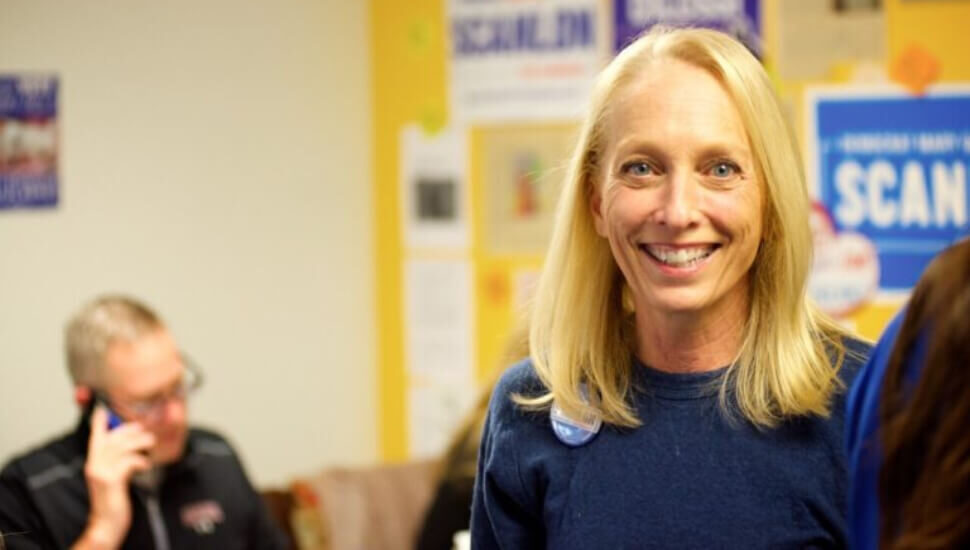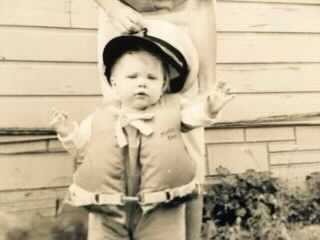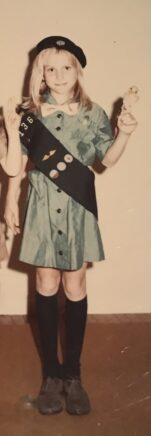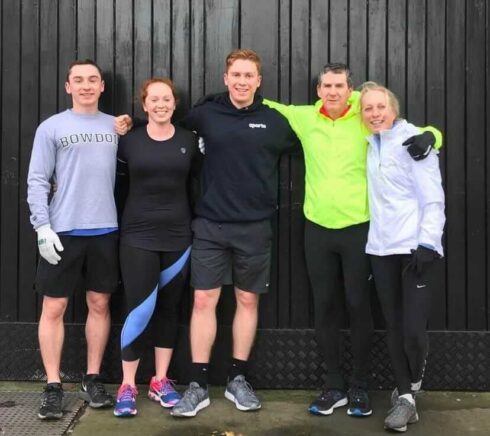Delaware County Leadership: U.S. Congresswoman Mary Gay Scanlon

U.S. Rep. Mary Gay Scanlon, who represents Pennsylvania’s 5th congressional district, a district that includes much of Delaware Couty, a small section of both Chester and Montgomery County as well as a section of South Philadelphia that includes the sports stadiums and the Navy Yard, spoke with DELCO Today about growing up in upstate New York; her father’s work as a junior member of President John F. Kennedy’s staff; the various jobs she had as a teenager and what she learned from them; and her decision to attend Colgate University.
Scanlon also discussed studying in Scotland for a year before entering law school at the University of Pennsylvania; the people who saw potential in her early in her career; and the opportunities and challenges she’s focused on in the new year.
Where were you born, and where did you grow up, Mary Gay?

I was born the oldest of three girls in Syracuse, New York, but spent most of my childhood in Watertown, New York on the Canadian border. Watertown was a place where on Halloween, we had to go dressed as a Ghost or something else that would fit over a snowsuit. Both my parents are from large, Catholic families. I have a lot of cousins, and most of them are named Mary something or something Mary, hence Mary Gay!
What did your parents do?
My father was a lawyer. He came out of the Marines, went to Law School, and went to work as a junior member of President John Kennedy’s staff in the White House for two years after graduation.
Both my parents were Kennedy Democrats. When President Kennedy was assassinated, we returned to Watertown, where my dad joined his father’s small Watertown law practice. Later, he did some work for Bobby Kennedy when Bobby ran for Senate in 1964 and then for President in 1968.
What about your mom?
My mom was an English professor at the local Community College, where she was one of the founding faculty members. In the 1970s, when the Education for All Handicapped Children Act, first passed, she started working with students with disabilities at the college.
What memories do you have of growing up in Watertown?

I remember a lot of outdoor activities. Growing up, we skied almost every weekend. My parents would pile us in a camper, drive us 45 minutes to the nearby ski hill where there was always snow, and ski every weekend from November through April.
In the summers, my mom’s family and eventually my parents had a place on the St. Lawrence River. Today, I do a lot of work with ports, and it brings me back to the great memories I have of growing up on the St. Lawrence Seaway.
Did you play any other sports in high school?
I ran track my very last year of high school. Girls’ sports were not that popular back then because Title IX was just beginning. In the summers, I did water skiing and swimming. I was a lifeguard all through college at a local state park. I learned to drive a boat when I was six years old and received my boating license when I was ten.
Who taught you how to steer a boat?
My dad taught me. Once we started spending our summers on an island, that’s how we got the groceries, and I was able to go on playdates. I didn’t go out on the river alone until I was 8 or 9, but I was driving the boat very early. With the independence and spatial awareness at that age, learning to drive a car, later on, was easy. I didn’t have to deal with wind and waves when I drove a car.
You mentioned being a lifeguard. Did you have any other part-time jobs when you were younger?
I never babysat until I was in law school. My first job was as a cleaning lady when I was thirteen. I would clean houses in a Victorian cottage community nearby. I had older cousins who cleaned houses, and as they got their work licenses and went to work in hotels and other resort areas, I filled in.
What lessons did you learn from those jobs that stick with you today?
Cleaning houses for people taught me humility. Something about scrubbing a toilet! I also learned to negotiate my wages better. I was thirteen, grateful to have a job, and wasn’t sure I was worth anything. When the first woman asked how much I charged, I waffled and told her$1.25 or $1.50 an hour, so she decided to pay me $1.35 an hour to clean her house. I learned the value of negotiation and not selling myself short after that!
What kind of music were you listening to back then?
I’m not a terribly musical person. I don’t sing. I took the obligatory instrument class in school. I usually listened to a lot of what my friends were listening to. I would listen to whatever the top 40 was on the local radio.
In college, it was more Indie Rock, which was popular at the time. Springsteen and Stevie Wonder were pretty much the anthems back then. I had friends who were in a band that played jazzy-Chicago-type music.
Where did you go to college?
I was a decent student. It depended on whether I liked the subject matter or not. Talk about things being different — in 1976, the year I graduated high school, there were no online forms or applications to fill out. I applied to Colgate University, where my father went, and Williams College because another lawyer at my father’s firm went there. I got into Colgate and majored in history.
Was Colgate a good choice?
Colgate was a great stepping stone for me. The number of my high school classmates who went to four-year colleges was small, maybe 10-percent of the kids. Most of those who went to private four-year colleges went to St. Lawrence University, which was further north. I was ready to go further away from home and do something different. It was an opportunity to do my own thing.
When did you decide to go to law school?
It was well before college. My father, grandfather, and several uncles were lawyers. I debated teaching for a while, which was what my mother, sister, and several aunts did. I figured out the through-line through both careers was words. I ended up doing education law, so I merged them in some ways.
Did you go right from college into law school?
I spent a year at the University of Aberdeen in Scotland between college and law school. It wasn’t for a degree. I enrolled at this Scottish University for a year and took Gaelic, British Constitutional Law, and International Law. I was able to travel a lot throughout that year too.
You went from Colgate to Aberdeen then to Penn Law?
Correct. I knew I wanted to be in a city because Watertown and Colgate are both rural. I kind of wanted to go to New York because a lot of my friends were going there, but I decided to go to the best law school that I got into, and that was the University of Pennsylvania in Philadelphia.
After law school, Mary Gay, who were the people who saw promise in you?
I clerked for J. Sydney Hoffman on the Superior Court for two years, and he was always an excellent promoter of his clerks. We had a network of clerks under him who would get together every year, which was a great opportunity for each of us.
Another person I have to mention is my husband, Mark Stewart. I met Mark in law school, and when I said things like “I think women can have it all – kids and a career!” he believed in me. When I got involved in the community and ran for school board or said I think I need to run for Congress, he was always right there supporting me. It’s a huge disruption to the family life, and he has been amazing.
What do you think your husband saw in you?
I don’t even want to try to go there! I do have a funny story from when we first started dating.
When we first started seeing one another. It was right when miniskirts came back in style. I wore one on a date, and he said, “Don’t wear that to law school!” Naturally, I wore it the next day.
Right after that, I applied to work at Penn’s legal clinic for the summer. After I interviewed, they asked the current clerks if anyone knew me, and one of his friends related the story of my defiant reaction to being told what to wear. So, in a way, I got my first law job because of that mini skirt.
Were there other people who saw your potential and opened doors, Mary Gay?
Arthur Makadon, who was the chair at Ballard Spahr. I was hired to be pro-bono counsel at Ballard, a dream job. I was paid to practice law in areas that I would have done for free, and they gave me a platform to make an impact in a lot of different ways and places.
Because of that job, I worked with nonprofits across the country for fifteen years and was able to work with amazing people on first amendment cases, civil rights, and poverty law. It was always reactive to something happening in the news because there was always a legal angle whenever something would happen.
That experience doing pro-bono work at Ballard prepared me for Congress. Having those contacts that I can reach out to and getting independent information from people who are really experts in the field is immeasurable. I heard many different perspectives by giving away free legal services to people or causes who otherwise couldn’t afford them from a platform at a commercial law firm that is working for corporations.
Looking forward into the new year, what challenges and opportunities are you focused on?
I ran for office because of the public interest work that I’ve been doing for decades. That remains top of mind. Certain central things like election integrity, voting rights, core civics, and good government inspired me to run in 2018. I saw the challenges our government was facing, which I came to realize were much more significant than I thought.
COVID continues to raise challenges, and the new variants are disrupting life again, so we must stay focused on keeping people safe so we can return to some form of normalcy.
At Thanksgiving, when we were in a COVID-lull, I traveled to Ireland with my family. That was the first trip I’ve taken since I took office in 2018. Ireland has a 94% vaccination rate, and people are following COVID-protocols — distancing, showing proof of vaccine, and providing a phone number for contact tracing. We heard of some minor protests there, but that’s just what you did for life to go on.
We know we have more to do here to make sure the healthcare system holds up. Since March of 2020, I’ve been holding weekly or biweekly calls with our hospital systems in the region so we can stay on top of what’s going on. We are making sure our hospitals have the supplies they need and are advocating for more vaccinations and more vaccination sites. Early in 2020, we worked with the craft distillers in Pennsylvania to get the waivers they required to produce hand sanitizers. That was interesting!
Job development for the region is overarching because that impacts so many things. We’ve done a lot of work with the shipyard. There’s so much we can do in that area. In 2018, they only had 80 employees at the shipyard after they laid off a massive number of employees. We’ve worked on securing a huge contract to build multi-mission maritime training vessels for all the maritime academies. That’s around $1.5 billion in equipment that will be built at the shipyard over the next few years! There are connections with our community colleges. They are training people to have the skills needed for job at the shipyard and elsewhere as the “boomer generation” retires.
Exciting things are happening at the airport as well.
Yes! I was just down there this morning. The airport will get money from the recently passed infrastructure bill and is investing more in cargo because business and leisure travel is down, and cargo is way up. It looks like business travel won’t rebound as quickly as leisure travel with such an increase in Zoom and Teams meetings.
There’s a port in Chester-Eddystone that has a shipping line to Cork, which is part of the reason I went to Ireland. I met with some officers there. It’s, in part, a boutique port for Irish goods, with that route just established a year ago.
As of now, the Navy Yard and the Port area are in my district. The stuff that’s going on in the Navy Yard in terms of bio-science development is just amazing. The Port continues to modernize. A lot of economic engines for the region! I love being able to represent a district that is about the region.
I think Upper Darby is the next Brooklyn. They are working on a lot of great things to make it attractive to those who live in the city, to younger people, and more.
What do you do in your free time, Mary Gay?

I don’t have a lot of free time! I have found that if I make something an official event that I can have fun at, that works. I officially run some 5K’s, now and then, or go to Rose Tree Park for the holiday lights or a concert. There are more free-time opportunities but this job representing 750,000 Americans in my district is all-consuming and a job that keeps me up at night sometimes.
Do you still ski?
I haven’t gone in years! I really would like to. My grandfather learned to ski when he was 75, so I have time.
What gives you hope, Mary Gay?
When I was a pro-bono lawyer for 15 years, I was definitely a glass-half-full person. As dark as D.C. can be at times, we’ve had successes here at home.
I love getting to work with kids. When I was at Ballard Spahr, I started a mentoring program with Constitution High School. We now have a Congressional Youth Cabinet in my office. Every month or two, I meet with high school juniors and seniors to discuss policy issues and how government works. I love this generation. They are passionate and not sitting on their hands. They are out there organizing getting things done, and they have realistic ideas. They are making things happen.
Finally, Mary Gay, what’s the best piece of advice you ever received?
Something that is always said in my family — my parents and siblings and husband — is to just show up. Often people don’t show up. Whether it’s for a 5K race or deciding to run for school board. Just act on what you believe in. The corollary is you can’t do everything, but you need to just show up. If you don’t participate, you can’t complain.
______
Publisher’s Note: Laura Manion contributed to this profile.
Join Our Community
Never miss a Delaware County story!
"*" indicates required fields














![95000-1023_ACJ_BannerAd[1]](https://delco.today/wp-content/uploads/sites/3/2023/03/95000-1023_ACJ_BannerAd1.jpg)















